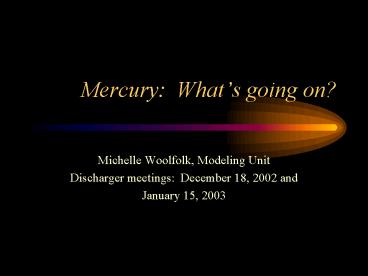Mercury: Whats going on - PowerPoint PPT Presentation
1 / 29
Title:
Mercury: Whats going on
Description:
Is there any evidence that mercury is a problem in North Carolina? ... Advises restricted consumption of largemouth bass, chain pickerel, bowfin caught from NC waters ... – PowerPoint PPT presentation
Number of Views:47
Avg rating:3.0/5.0
Title: Mercury: Whats going on
1
Mercury Whats going on?
- Michelle Woolfolk, Modeling Unit
- Discharger meetings December 18, 2002 and
- January 15, 2003
2
Questions
- Why is mercury a concern?
- How much mercury is acceptable in surface water?
Fish? - Is there any evidence that mercury is a problem
in North Carolina? - Why is the coastal area a target (versus mountain
or piedmont)? - What is the source of mercury in surface water?
Fish?
3
(No Transcript)
4
NC Fish Eating Advice
- Issued in April 2002
- Advises restricted consumption of largemouth
bass, chain pickerel, bowfin caught from NC
waters - Establishes range of south and east of I-85
5
Confusing Issue 1 How high is too high?
(Criteria)
- Federal criteria
- Food and Drug Administration (FDA) 1 mg/kg
- Environmental Protection Agency (EPA) 0.3 mg/kg
- After careful review and consideration by the NC
Air Quality Scientific Advisory Board, - NC Dept of Health and Human Services 0.4 mg/kg
6
Water Quality Criterion Methylmercury
- EPA published January 2001
- Tissue Residue Criterion of 0.3 mg/kg
- Calculated using human health risk assessment
methodology - Target water concentration back-calculated using
multiple site-specific factors - water to fish bioaccumulation factor
- total mercury to methyl mercury translator
7
Risk from Methylmercury Exposure
- Adult nervous system effects at high levels
- Nervous system of developing fetus affected at
lower exposure levels - Recent Studies
- Seychelles, Faroes Islands, New Zealand
- Varying estimates of no risk exposure
- SAB 0.17 mg/kg/day
Presented to EMC by G. Lucier, PhD of the SAB
8
Environmental Exposures to Methylmercury
- Mercury is ecologically and biologically
persistent - Exposures measured through fish consumption and
methylmercury levels - Hair effective measures of past exposure
Presented to EMC by G. Lucier, PhD of the SAB
9
North Carolina Hair Mercury Levels
Provided by Dr. Gregory Smith, NC DHHS
Presented to EMC by G. Lucier, PhD of the SAB
10
Confusing Issue 2 How to define areas of
concern ?
- Criteria, apply as mean, median, or reasonable
maximum - Fish tissue data
- Easily recognizable by the general public
11
(No Transcript)
12
5/11/2001
13
4/24/2001
14
Confusing Issue 3 What is DWQ doing in all
this mess ?
- Fish consumption advisories indicate a loss of
use of a water body, so - Waterbodies are impaired (303(d) list)!!!
- DWQ administers the NPDES program
- DWQ and EPA are responsible for developing Total
Maximum Daily Loads for these waterbodies
15
Confusing Issue 4 Where is the mercury coming
from ?
- Direct discharges of wastes containing mercury
- Indirect discharges of mercury from
- Air (wet and dry deposition)
- Overland runoff (residential and industrial
areas, and wetlands)
16
But, its even more confusing than that
- Mercury from air can be from local sources or
from across the globe - Just because mercury gets into the aquatic system
doesnt mean it will accumulate in fish - AND everything depends upon the form of mercury
(Hg0, Hg2, MeHg)
17
Predicting the Impact of Airborne Mercury
Emissions
Hg can travel long distances before depositing
Hg emitted to air or overland runoff
End consumer
Hg accumulation in fish
Hg in water transforms to MeHg
Presented to EMC by G. Lucier, PhD of the SAB
18
Wetlands Good for the environment! (Except for
mercury)
More MeHg Out
MeHg In
Wetlands export much more MeHg than they receive
Presented to SAB by R. Harris, PhD of the
TetraTech, Inc.
19
What kinds of lakes tend to have higher fish Hg?
- Low productivity
- Low pH
- Moderate to high DOC
- Presence of wetlands
- Smaller, warm lakes
Presented to SAB by R. Harris, PhD of the
TetraTech, Inc.
20
- Mercury Deposition Network (MDN)
- Weekly collections
- Hg concentration, precipitation, deposition
21
Total mercury in aquatic environments
Sources USGS 2000 and MCFRBA
22
Why should DWQ use Method 1631?
23
(No Transcript)
24
Methyl mercury in aquatic environments
Source USGS 2000
25
Mercury Cycling in D-MCM
Wet and dry Deposition
Volatilization
Outflow
Hg(0)
Inflow/Runoff
Reduction
Photodegradation
Oxidation
Hg(II)
MeHg
Settling/Resusp Diffusion
Settling/Resusp Diffusion
Bioaccumulation
Hg(II)
MeHg
Burial
Burial
Demethylation
Methylation
26
NC Eastern Regional Mercury Study
- Funded by USEPA grant
- Goals
- Evaluate levels of ambient mercury in surface
water systems - Estimate site-specific total mercurymethyl
mercury translators to evaluate water quality
criteria - Estimate site-specific water to fish
bioaccumulation factors - Evaluate potential mercury loads from WWTPs
27
NC Eastern Regional Mercury Study
- Using clean methods (handling and analysis, incl.
Method 1631) - Study conducted for one year
- Monitor quarterly
- total and methyl mercury in surface water
- total and methyl mercury in sediment
- Monitor annually
- mercury in fish
28
NC Eastern Regional Mercury Study
- South and Black Rivers (CPF)
- Waccamaw River and Lake Waccamaw (LBR)
- Lumber River (LBR)
- Eno River (NEU)
- Contentnea Creek (NEU)
- Kendricks Creek (PAS)
- Phelps Lake (PAS)
- Cashie River (ROA)
- Ledbetter Lake (YAD)
- Abbotts Creek (YAD)
29
For more information
- DHHS Fish Eating Advice http//www.schs.state.nc.
us/epi/fish/mercuryadvice.html - SAB mercury review http//daq.state.nc.us/toxics/
risk/sab/finalHgReport.pdf - DWQ mercury fish tissue results are reported in
basin assessment documents. - EPA Water Quality Criteria http//www.epa.gov/ost/
criteria/methylmercury/ - FDA Mercury Advisory http//www.cfsan.fda.gov/dms
/admehg.html - Impaired Waters (Integrated Report/303(d) List)
http//h2o.enr.state.nc.us/tmdl/General_303d.htm































